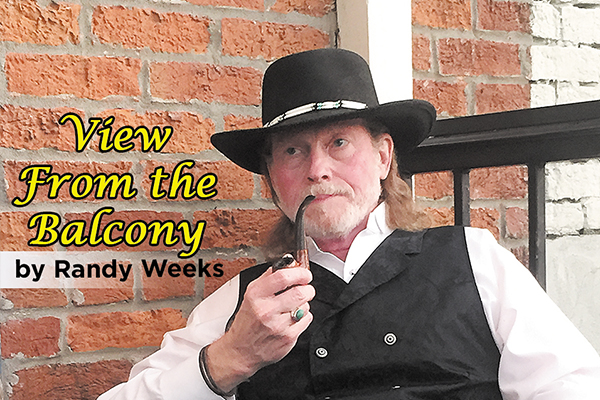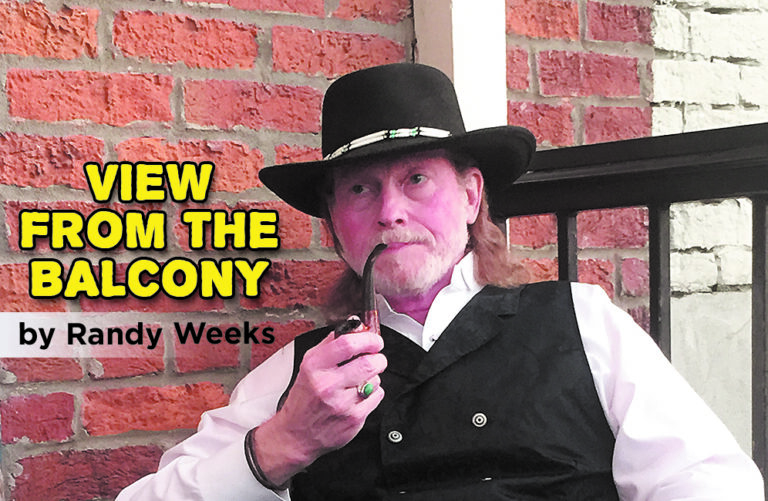
Recently my good friend, Z.Z. Bullfrog, a pithy man, rode with me to Dyess, Arkansas, for the Johnny Cash Festival. It was a great weather day, which was important because it was an outdoor venue, and we all had to park at a school about five miles away and ride to the site in cotton trailers.
The concert started at 12:30 pm. For about three hours we listened to Cash’s sister, Joanne, his brother, Tommy, and some guy named Buddy Jewell perform. (Jewell was the first winner of the USA Network talent show, Nashville Star, in 2003.) Jewell spent most of his time cross- and flag-waving. Z.Z. and I figured that tolerating Jewell must have been the part of the price of admission that was in the fine print nobody reads on the back of our tickets. Sure enough, the tickets said, “Prior to the headliners, attendees may be subjected to far-right pontifications and pandering, including, but not limited to, the waving of a cross wrapped in the American flag. Deal with it.”
When Z.Z. and I’d had a belly full of Jewell—which didn’t take long—we escaped to get some water and take a restroom break, then we turned our backs to the stage so we could enjoy the south wind that swept over the barren cotton fields, drowning out the sermonizing.
Finally, the man I’d come to see, the iconic singer-songwriter who was a Rhodes scholar, an Army Ranger helicopter pilot, and a janitor at Columbia Records, walked on stage. I was about to check another experience off my bucket list.
Kris Kristofferson is 81 years old. A few years ago he was misdiagnosed as having Alzheimer’s disease. Last year the mistake was discovered. Kris actually had Lyme disease that caused brain fog, memory lapses, and sometimes passing out. Once he started the right treatment, Kris started improving. Things were finally looking up.
Kris kicked off his 45-minute set with “Me and Bobbie McGee.” (Janice Joplin recorded that song in 1969. It was released posthumously in 1970, and it went to the top of the charts. The same year Johnny Cash hit pay dirt with another Kristofferson song, “Sunday Mornin’ Comin’ Down.”) Only a few measures into “Me and Bobbie McGee” the damages from the Lyme disease became evident. Kris struggled to hit his low notes and there was an abundance of buzzing guitar strings. I swallowed hard. A sadness welled up inside of me. I sensed that others felt it, too.
A profound, reverential hush came over the crowd, as if we all were thinking, “This may not be the Kris Kristofferson that used to wow people in performances, but it sure as hell is the legendary Kris Kristofferson that wrote so many of the greatest songs of our time.”
One by one Kris sang his songs. For me, they took on new meaning. “Help Me Make It Through the Night” went from a plea to a lover to a heartfelt appeal for support from the crowd. Instead of being about the end of a romance, “For the Good Times” seemed to be Kris’ way of saying, “I’m on the way out so let’s do this for all our yesterdays.” “The Pilgrim,” which Kristofferson wrote about the gritty old pioneers of outlaw country—before the term existed—like Ramblin’ Jack Elliott, now sounded like Kris had written it about himself.
There were deeply moving moments when we all sang along with Kris. We were in a holy place, mesmerized in an outdoor cathedral, attending a mass tribute to Kristofferson’s life. “Why Me, Lord?” became more of a sacred prayer than ever before.
The most poignant time for me was when Kris sang “Please Don’t Tell Me How the Story Ends.” He seemed to be saying, “I don’t wanna talk about tomorrow or forever. I just wanna sing.” All of us there paid homage to a man who knows what’s coming, knows it may come soon, and is squeezing every last drop of heaven out of this world before going to the next.
Kristofferson’s songs will far outlive him. His memory will take on mythic proportions. We’ll talk about him with the same veneration afforded to people like Johnny Cash, Waylon Jennings, Merle Haggard, Jerry Jeff Walker, and Hank Williams. Kris, your story won’t be finished with your last breath, so don’t worry. We won’t tell you how the story ends. We don’t know. It won’t be over until someone sings your songs for the last time and that will be a long, long time.
This could be our last good night together.
We may never pass this way again.
Just let me enjoy it ‘til it’s over, or forever.
Please don’t tell me how the story ends.
